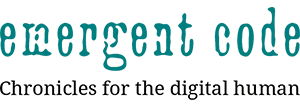1.23 Open access and the human condition
 ‘Welcome to the future’, the app’s release note says. ‘This has never been done before in history’ it goes on. A bold claim from Citymapper (the ‘ultimate transport app’), available now in the latest update on your phone.
‘Welcome to the future’, the app’s release note says. ‘This has never been done before in history’ it goes on. A bold claim from Citymapper (the ‘ultimate transport app’), available now in the latest update on your phone.
What was that Neil Armstrong said about small steps and giant leaps for mankind? Now, your steps are counted. When you arrive anywhere, (metaphorically or otherwise), a piece of code will be sitting behind the fact that you did, powering the thrill of ‘realtime arrival predictions’.
As we cede these little moments of human triumph to code, we’re creating a sense of open access about the human condition. Going digital might mean we’re able to sort out the frailties of the human condition, our own bug fixes, as part of a new release.
Can we make a quantum leap by understanding our darkest patterns and pathologies using code? This is an intriguing question, one about the scope we have for human advancement, as well as who gets to decide what that scope is, and why.
Digital communication has become multi-sensory over the last few years and online experiences are being enhanced by rich, immersive and responsive media, more of the time. This is life as data, life more measured. Digital life is tracking body responses, human functions, social movements..but the nature of code is numerical. It emphasises quantity over quality, and not always comfortably so.
Code today is more data-centered than human-centered. It is focused on meeting the needs of data harvesters more than on enhancing the quality of the collective human condition. In these early days of code, it’s fascinating to devour all this new information about ourselves, but how does it enhance the human experience and satisfy us?
Ephemeral existence
As giant internet companies go about the business of aggregating our data, an increasing discomfort with digital surveillance has spawned an ‘ephemeral web’. Apps like Snapchat are popular because they make shared experiences disposable and forgettable. ‘Digital natives’ might expect to be monitored, but the counterpoint becomes forgettable experiences, lives half-lived. Shared memories become public property.
In such conditions, open access means we are on the brink of being ghosts of our real selves. It may be only a small matter of time before the idea of humans acting out real-time predictive and prescriptive behaviour becomes normative, if it isn’t already.
So, what do we want our next OS to be made of?
In a monitored world, some of life’s richest and most organic gifts, spontaneity and the delight of discovery, intimacy, trust and emotion, are fragile. And some of life’s simplest goals, desiring live well by just being, listening, and the act of opening up to how we feel, might be compromised as always-on surveillance becomes part of a human condition.
If what we settle for is life as unique identifiers operating within some kind of giant digital petri dish, aren’t we limiting the true heights of selves and the potential of all our collective wisdom?
The Centre for Planetary Culture has this view on where we are currently: ‘We appear to have reached one of those rare, extraordinary junctures in human history when a thorough transformation of society, culture, and consciousness is necessary. Climate change is the most urgent of many impending threats. As individuals, we must understand and accept the critical nature of our time. For the sake of future generations, we can become part of a wave of awakening and of action, that grows exponentially.
Under this extreme time pressure, there is great potential to quickly develop and distribute a new social model based on an ethos of global citizenship and planetary stewardship.
For this to happen, humanity must act upon our unique capacities for self-awareness and foresight. We have an opportunity to fully activate the prefrontal cortex – the brain structure that makes us uniquely human, which developed in the last forty thousand years. We must collectively work to envision a new model for planetary civilization, then design and manifest it.’
It proposes a model to work towards a regenerative society, recognising that human renewal is needed.
As we open up data around the human condition, can a long-term digital path lead to a better planetary cultural and heritage that we can protect and curate or will code simply mean more online campaigns and content robots?


